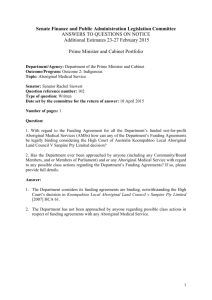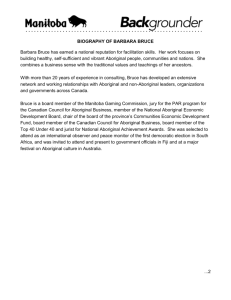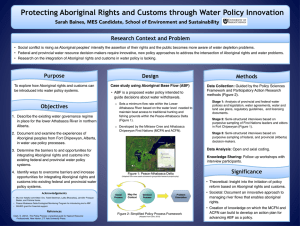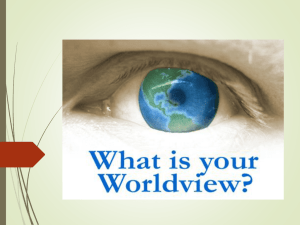Laws and Justice
advertisement
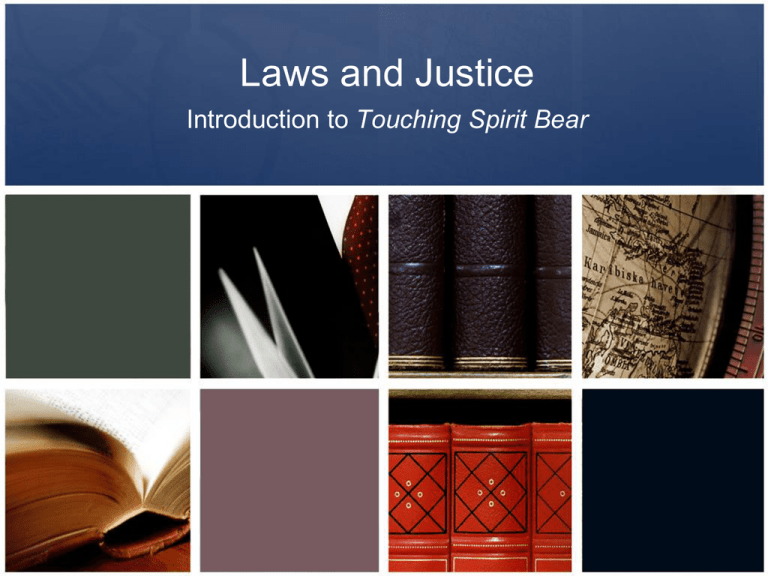
Laws and Justice Introduction to Touching Spirit Bear How are Laws Made? • In the U.S. laws are made by governments. • Governments have the right to make laws because they are chosen by the people of the U.S. • Governments cannot just make any law; they must use laws to govern people. This is what makes the government different than a dictator or a king or queen. • The government must go through the steps necessary to pass a law. • Once the law is passed, everyone, including the government, must obey the law. • American laws then represent the wishes of the people, through their elected representatives. • A quick little video… • http://bit.ly/r9hN8y Societal Laws • Different societies and even the people within the same society view laws as coming from different sources. • What a society considers the source(s) of laws is influenced by that society’s worldview. • A society may view laws as: – Coming from a higher power, such as God or the Creator – Reflecting the laws of nature – Coming from customs or practices that over time have come to be considered laws Western Views • The idea that laws are made by people is in keeping with the Western view of people’s place in the world. • Western societies often view people as ruling over other things in the world such as nature, plants and animals. • An example of this is the belief that the world was created by God for humans. Aboriginal Hierarchy • In contrast, from an Aboriginal worldview, humans are the least powerful and least important factor in creation. • There is a hierarchy based on dependencies. – Mother Earth is first since everything and everyone depends on the earth for survival. – The plant order is next since the animal world needs the plant world to survive. – After that comes the animal order. – Humans are the last order. The animal order has taught humans how to hunt, what is good to eat and how to survive the cold. • Aboriginal laws developed and evolved to meet the needs of the communities and their members. • They reflect the principles and values of the particular peoples they govern. • Sometimes these laws are called customary laws. Custom is what people do. • Customary law is not made by people in power; it is made by people as a whole and is a reflection of commonly held ideas of right and wrong, values and moral principles. • Both Aboriginal and Western traditions also see laws as coming from nature and from a higher power. • In the Aboriginal tradition law comes from the Creator and is observable in nature. • The Western view of law also sees laws as coming from both nature and God. • For example the Ten Commandments can be seen as the source of laws against murder, theft and perjury (lying in court under oath). • The idea of natural law also exists in the Western tradition. • According to natural law the fundamental principles of all laws come from nature or from a supreme being, not from creation of human societies. • The idea that there are natural rights of all humans can be seen in the our Declaration of Independence, which states that “all men are created equal” and that they are “endowed by their creator with certain unalienable rights.” Start a list of vocabulary… • Morals: A person's standards of behavior or beliefs concerning what is and is not acceptable for them to do. • Laws: a system of rules and guidelines that are enforced through social institutions to govern behavior, wherever possible. • Customs: traditional and widely accepted ways of behaving or doing something that is specific to a particular society, place, or time. Create this table in your journals Law or Rule Supreme Being No hitting or pushing in school golden rule – treat others as you would like to be treated ants working cooperatively for the good of the colony settling disagreements peacefully for the good of all laws against assault You are to be home by 10pm honor thy mother and father - one of the Ten Commandments young dependent on parents to learn how to survive parents being responsible for looking after their children curfew laws, laws giving parents rights and responsibilities toward their children No stealing allowed Kids are not allowed to smoke cigarettes Kids have to go to school Nature Custom Government





